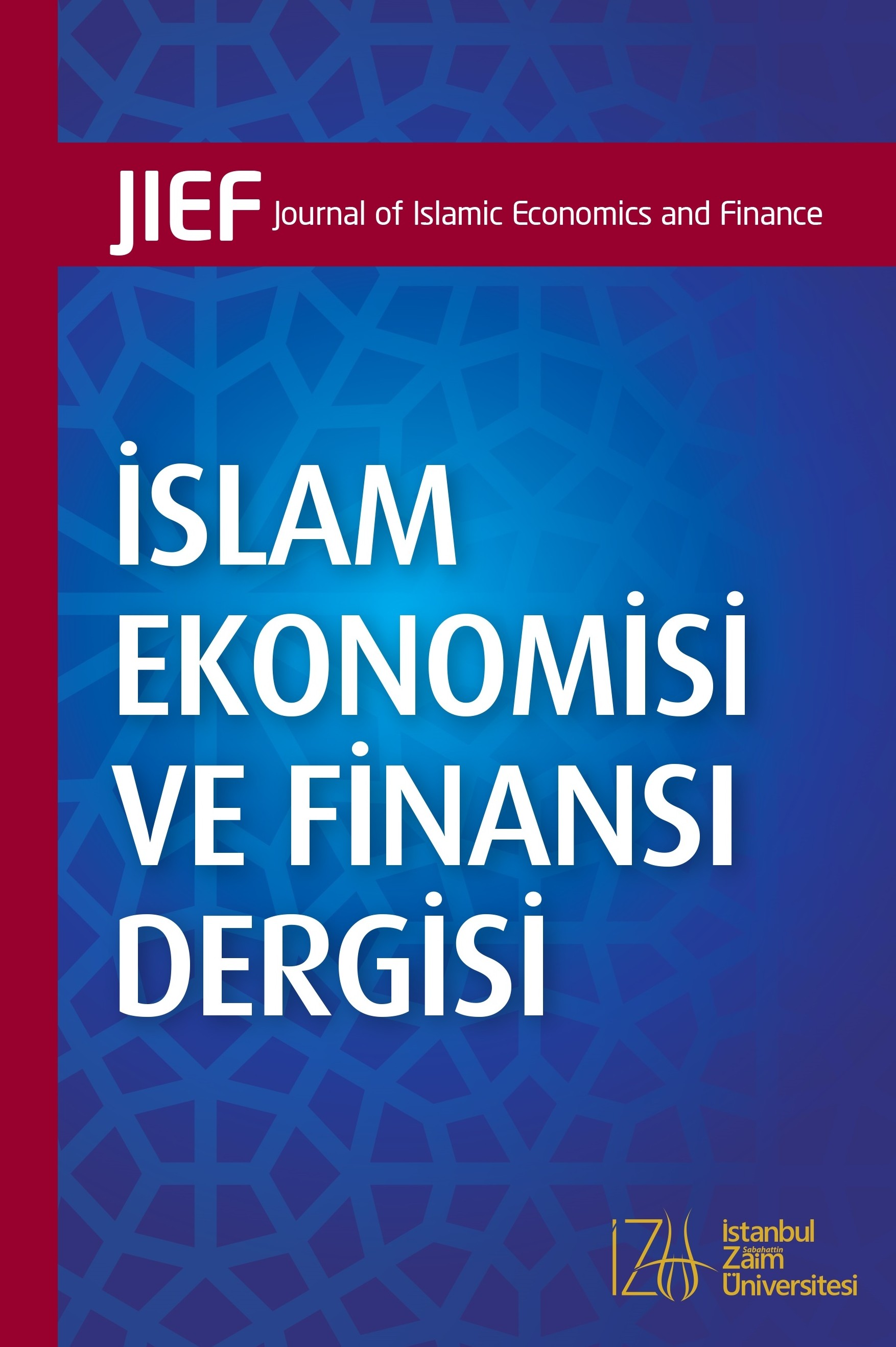KATILIM BANKACILIĞI İHRACAT FİNANSMANINDA SELEM VE İSTİSNA YÖNTEMLERİNİN KULLANIMI VE KARŞILAŞTIRMALI ANALİZİ
Günümüzde faizsiz bankalar müşterilerini sevk öncesi ihracat finansman imkânlarından faydalandırmak için pek az imkâna sahiplerdir. Konvansiyonel bankalar sevk öncesi ihracat finansmanını faizli kredilerle rahatlıkla gerçekleştirebildikleri halde faizsiz bankalar ihracatçılara sadece selem ve istisna akitleri yoluyla finansman sağlayabilirler. Bu akit türlerinin sevk öncesi ihracat finansmanında hangi şartlar altında kullanılabileceği ve bu akitlerin faizsiz bankalara yükleyebileceği riskler bu makalede araştırılmıştır. Ayrıca bu iki akit türü akreditifli işlemlerle birleştirilerek, faizsiz bankacılık için sevk öncesi ihracat finansmanına bir örnek model de makale içerisinde sunulmuştur.
Anahtar Kelimeler:
Katılım Bankacılığı, Selem, İstisna, İslami Finans, İhracat Finansmanı
THE USE OF SALAM AND ISTISNA’ CONTRACTS IN PARTICIPATING BANKING FOR EXPORT FUNDING, THEIR COMPARATIVE ANALYSIS AND DESIGN OF A MODEL
The purpose of writing the article is to compare the salam and istisna’ contracts used by participation banks in pre-shipment export financing and to help these banks determine which of the contracts they should prefer according to the situation and conditions. Today, interest-free banks have little opportunity to benefit their customers from pre-shipment export financing opportunities. While conventional banks can easily realize pre-shipment export financing with interest-bearing loans, interest-free banks can only provide financing to exporters through salam and istisna’ contracts so that they can purchase goods that have not yet been produced through financing. The conditions under which these methods can be used in pre-shipment export financing and the risks that these contracts may impose on interestfree banks are investigated in the article. In addition, a sample model for preshipment export financing for interest-free banking, by combining these two contract types with letter of credit transactions, is presented in the article. The findings are as follows: If the export subject is a standard good to be produced, the salam contract should be selected, and if it is a non-standard product to be manufactured, the istisna’ contract should be selected. Participation banks must make the payment in advance in the salam contract. In the istisna’ contract, it can make the payment in cash or as it is delivered to the exporter after the production takes place. The bank should prefer the salam contract in producer/supplier financing, and the istisna’ contract in producer financing. In the istisna’ contract, the customer or the manufacturer can cancel the contract if the production has not started yet or by giving prior notice. If the bank does not want to take this risk, it should prefer the salam contract. The delivery time can be changed in the istisna’ contract. When the bank has to comply with the terms in the letter of credit, it should prefer the salam contract.
Keywords:
Islamic Finance, Participation Banking, Salam, Istisna, Export Financing,
___
- AAOIFI (2012). Faizsiz Bankacılık Standartları. İstanbul: Türkiye Katılım Bankaları Birliği. Yayın No: 2.
- Ahmad, A. (1994). Contemporary Practices of Islamic Financing Techniques. Islamic Economic Studies, 2(1).
- Aktan, H. (2001). İstisna. TDV İslam Ansiklopedisi. Cilt: 23, s. 393-396.
- Anwer Z. (2019). Salam for Import Operations: Mitigating Commodity Macro Risk. Journal of Islamic Accounting and Business Research.
- Araz, Y. (2020). İstisna Akdi ve Modern Dönem İslami Finans Uygulamalarındaki Yeri. İlahiyat Tetkikleri Dergisi. Aralık 2020/2, 54: 253-277.
- Aybakan, B. (2009a). Selem. TDV İslam Ansiklopedisi. Cilt: 36, s. 402-405.
- Bayındır, S. (2005). İslam Hukuku Penceresinde Faizsiz Bankacılık. İstanbul: Rağbet Yayınları.
- Bilal, M. (2016). International Trade under Islamic Banking. Journal of Philosophy, Culture and Religion. Vol. 21, 2016.
- Billah, M.M. (2019). Islamic Financial Products (Principles, Instruments and Structures). Palgrave Macmillan.
- Grath, A. (2008). The Handbook of International Trade and Finance: the Complete Guide to Risk Management, And Guarantees, Credit İnsurance And Trade Finance. Kogan Page Limited: Great Britain and United States.
- Gulf News (2003). Salam can be used as tool of pre-shipment finance. https://gulfnews.com/uae/ salam-can-be-used-as-tool-of-pre-shipment-finance-1.348274 [20.04.2021].
- Hassan, M.K. & Lewis, M.K. (2007). Handbook of Islamic Banking. USA: Edward Elgard.
- Kahf, M. (1999). Financing International Trade: An Islamic Alternative. In Seminar on International Trade from Islamic Perspective.
- Khaleefa, M. O. (1993), Islamic Banking in Sudan’s Rural Sector. Islamic Economic Studies.
- Muhammad, M.Z. & Chong, R. (2007). The Contract of Bay’ Al-Salam and Istisna in Islamic Commercial Law: A Comparative Analysis. Labuan e-Journal of Muamalat and Society, Vol. 1, 2007, 21-28.
- Shabbir, M. S., Ghazi, M. S., & Akhtar, T. (2016). The relationship between traditional as well as modern modes of financial instruments for international market through Islamic finance. The Journal of Internet Banking and Commerce, 21(1).
- Studylib (2021). Export Financing Interest Based Export Refinance Scheme https://studylib.net /doc/8162833/export-financing-interest-based-export-refinance-scheme [20.04.2021].
- Tomanbay, M. (2003). Dış Ticaret Rejimi ve İhracatın Finansmanı. 4. b. Ankara: Hatiboğlu Yayınları.
- Yaran, R. (2014). İslam Hukukuna Göre Hukuki işlemler ve Hükümleri (Eşya Hukuku ve Borçlar Hukuku), Diyanet Vakfı Yayınları, Ali el-Hafif.
- ISSN: 2149-3820
- Yayın Aralığı: Yılda 2 Sayı
- Başlangıç: 2015
- Yayıncı: İstanbul Sabahattin Zaim Üniversitesi
Sayıdaki Diğer Makaleler
İslami kusurlu sorumluluk sisteminin mesleki topluluk üzerindeki ekonomik etkileri
YOKSULLUĞUN YENİDEN TANIMLANMASI İÇİN DÖRT BOYUTLU İSLAMİ BİR ÇERÇEVEYE DOĞRU
Osmanlı Devletinde Vakıf Kütüphaneleri
ŞERİAT’N MAKSATLARI IŞIĞINDA DÖNGÜSEL EKONOMİ KAVRAMI ÜZERİNE ELEŞTİREL BİR DEĞERLENDİRME
ISCOIN’İN DİĞER YATIRIM ARAÇLARINA GÖRE KARŞILAŞTIRMALI GETİRİSİ
Çocuk Yoksulluğunu Önlemeye Yönelik Bir Sivil Toplum Girişimi: İHH’nın Yetimleri Destekleme Programı
